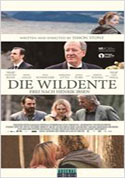

Opening 27 Oct 2016
Directed by:
Simon Stone
Writing credits:
Simon Stone, Henrik Ibsen
Principal actors:
Sam Neill, Geoffrey Rush, Miranda Otto, Paul Schneider, Anna Torv
This film is a modern version of the Norwegian author Henrik Ibsen’s play entitled The Wild Duck. While the original play is set in Norway at the end of the nineteenth century, the film takes place here and now in a logging area of a remote part of Australia. The focus in both is the question of how to deal with an existential lie. Should it be exposed, regardless of the consequences for the people involved, or is it better to keep things secret to avoid negative repercussions? Ibsen’s play also revolves around the question of whether or not 19th century society is prepared for self-determined democracy instead of aristocratic protectionism. The film, on the other hand, contains a somewhat simplified commentary on capitalism.
In both the play and the movie a wild duck plays a central role. It has been shot but not killed by a wealthy capitalist, here a man called Henry (Rush), the owner of a logging company. The duck represents people who have been hurt by the dealings of such a person. Normally a wild duck that is injured will sink to the bottom of a lake and die. But here it is rescued and cared for by a former employee, Walter (Neill), the victim of a bad business deal he conducted with Henry, and by Walter’s granddaughter Hedwig (Odessa Young). Henry’s estranged son Christian (Schneider) appears on the scene as an advocate of truth at all costs. In Ibsen’s play this figure is idealistic and other-worldly; in the movie he is emotionally unstable, vengeful, and highly neurotic. The person Christian seeks to enlighten is Oliver (Ewen Leslie), a former friend and Walter’s son. The plot thickens as Christian reveals a past secret to Oliver that casts him into rage and despair. At this point the play and movie diverge significantly. Ibsen’s play continues as a subtle tragicomedy with an unequivocal ending, while the movie evolves into a heavy-duty melodrama with an open end.
The film is well worth watching, especially if you enjoy Ibsen, but in view of the moral structure of contemporary society, where patchwork families, multiple forms of paternity, and DNA tests are an everyday thing, the high drama at the end of the movie is not very convincing. (Pat Nevers)